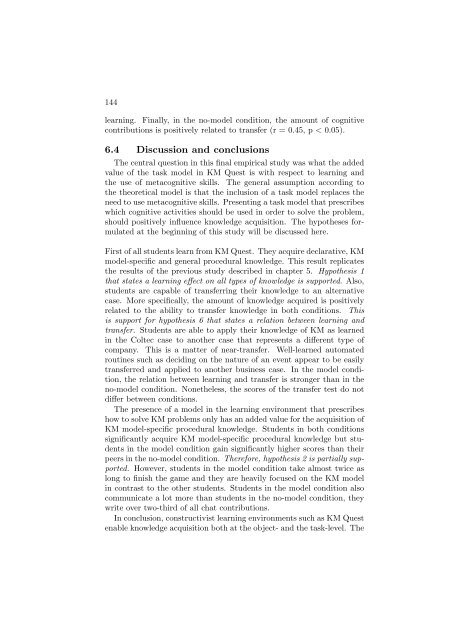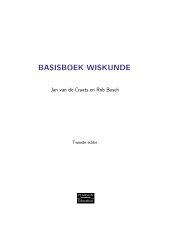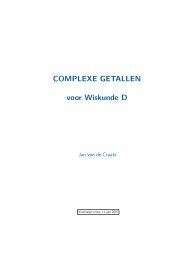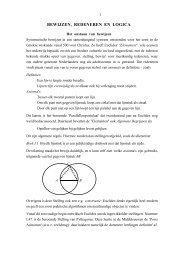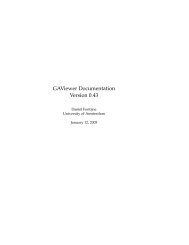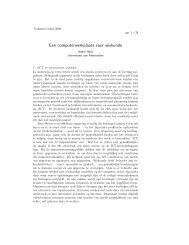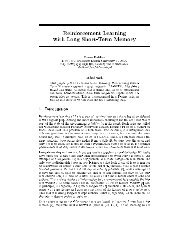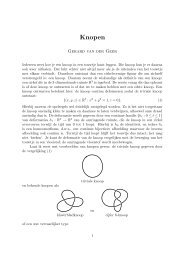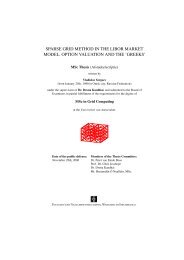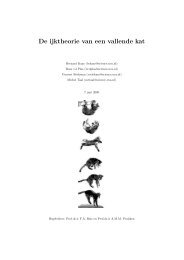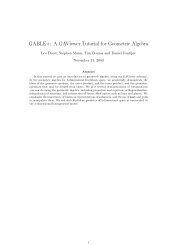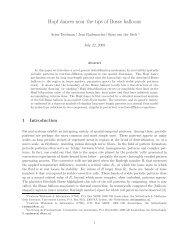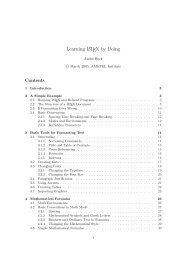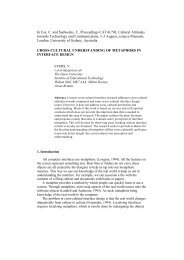The role of metacognitive skills in learning to solve problems
The role of metacognitive skills in learning to solve problems
The role of metacognitive skills in learning to solve problems
You also want an ePaper? Increase the reach of your titles
YUMPU automatically turns print PDFs into web optimized ePapers that Google loves.
144<br />
learn<strong>in</strong>g. F<strong>in</strong>ally, <strong>in</strong> the no-model condition, the amount <strong>of</strong> cognitive<br />
contributions is positively related <strong>to</strong> transfer (r = 0.45, p < 0.05).<br />
6.4 Discussion and conclusions<br />
<strong>The</strong> central question <strong>in</strong> this f<strong>in</strong>al empirical study was what the added<br />
value <strong>of</strong> the task model <strong>in</strong> KM Quest is with respect <strong>to</strong> learn<strong>in</strong>g and<br />
the use <strong>of</strong> <strong>metacognitive</strong> <strong>skills</strong>. <strong>The</strong> general assumption accord<strong>in</strong>g <strong>to</strong><br />
the theoretical model is that the <strong>in</strong>clusion <strong>of</strong> a task model replaces the<br />
need <strong>to</strong> use <strong>metacognitive</strong> <strong>skills</strong>. Present<strong>in</strong>g a task model that prescribes<br />
which cognitive activities should be used <strong>in</strong> order <strong>to</strong> <strong>solve</strong> the problem,<br />
should positively <strong>in</strong>fluence knowledge acquisition. <strong>The</strong> hypotheses formulated<br />
at the beg<strong>in</strong>n<strong>in</strong>g <strong>of</strong> this study will be discussed here.<br />
First <strong>of</strong> all students learn from KM Quest. <strong>The</strong>y acquire declarative, KM<br />
model-specific and general procedural knowledge. This result replicates<br />
the results <strong>of</strong> the previous study described <strong>in</strong> chapter 5. Hypothesis 1<br />
that states a learn<strong>in</strong>g effect on all types <strong>of</strong> knowledge is supported. Also,<br />
students are capable <strong>of</strong> transferr<strong>in</strong>g their knowledge <strong>to</strong> an alternative<br />
case. More specifically, the amount <strong>of</strong> knowledge acquired is positively<br />
related <strong>to</strong> the ability <strong>to</strong> transfer knowledge <strong>in</strong> both conditions. This<br />
is support for hypothesis 6 that states a relation between learn<strong>in</strong>g and<br />
transfer. Students are able <strong>to</strong> apply their knowledge <strong>of</strong> KM as learned<br />
<strong>in</strong> the Coltec case <strong>to</strong> another case that represents a different type <strong>of</strong><br />
company. This is a matter <strong>of</strong> near-transfer. Well-learned au<strong>to</strong>mated<br />
rout<strong>in</strong>es such as decid<strong>in</strong>g on the nature <strong>of</strong> an event appear <strong>to</strong> be easily<br />
transferred and applied <strong>to</strong> another bus<strong>in</strong>ess case. In the model condition,<br />
the relation between learn<strong>in</strong>g and transfer is stronger than <strong>in</strong> the<br />
no-model condition. Nonetheless, the scores <strong>of</strong> the transfer test do not<br />
differ between conditions.<br />
<strong>The</strong> presence <strong>of</strong> a model <strong>in</strong> the learn<strong>in</strong>g environment that prescribes<br />
how <strong>to</strong> <strong>solve</strong> KM <strong>problems</strong> only has an added value for the acquisition <strong>of</strong><br />
KM model-specific procedural knowledge. Students <strong>in</strong> both conditions<br />
significantly acquire KM model-specific procedural knowledge but students<br />
<strong>in</strong> the model condition ga<strong>in</strong> significantly higher scores than their<br />
peers <strong>in</strong> the no-model condition. <strong>The</strong>refore, hypothesis 2 is partially supported.<br />
However, students <strong>in</strong> the model condition take almost twice as<br />
long <strong>to</strong> f<strong>in</strong>ish the game and they are heavily focused on the KM model<br />
<strong>in</strong> contrast <strong>to</strong> the other students. Students <strong>in</strong> the model condition also<br />
communicate a lot more than students <strong>in</strong> the no-model condition, they<br />
write over two-third <strong>of</strong> all chat contributions.<br />
In conclusion, constructivist learn<strong>in</strong>g environments such as KM Quest<br />
enable knowledge acquisition both at the object- and the task-level. <strong>The</strong>


